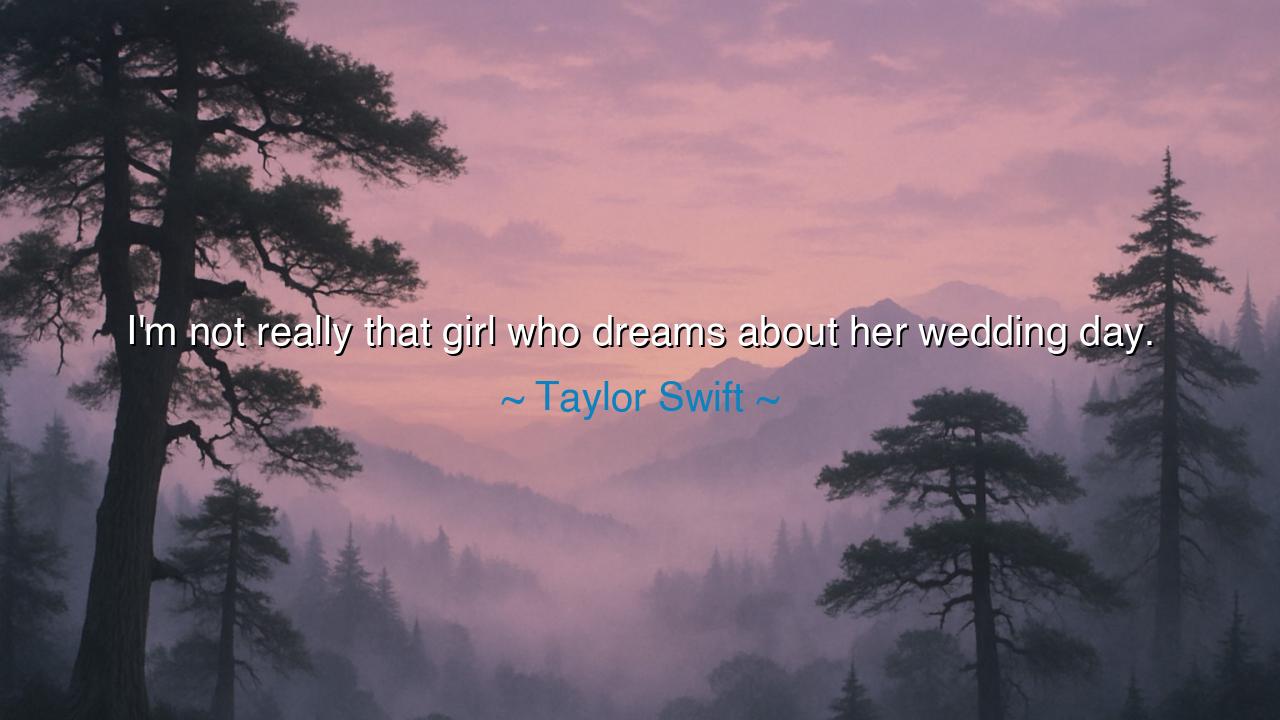
I'm not really that girl who dreams about her wedding day.






The artist and poet of the modern age, Taylor Swift, once confessed with quiet honesty: “I’m not really that girl who dreams about her wedding day.” At first, these words may seem simple — a passing remark about romance and expectation — but they carry within them the strength of a soul that has chosen authenticity over tradition, self-discovery over fantasy, and independence over conformity. In her voice echoes the cry of countless women across generations who have sought not the crown of the bride, but the freedom of the dreamer — those who dared to define themselves not by ceremony or social custom, but by the vastness of their own spirit.
In saying this, Swift speaks to something profound about identity and purpose. For ages, the image of a wedding day has stood as the symbol of fulfillment — the promised ending of every fairy tale, the supposed measure of a woman’s happiness. Little girls were taught to imagine veils and vows before they imagined voyages or victories. Yet Swift, a maker of stories and melodies, turns from that dream, not in bitterness, but in awakening. Her words whisper to us that life’s truest dreams are not handed down by culture — they are discovered within. To her, love is not a destination marked by flowers and vows, but a journey of two evolving souls — and womanhood, not a role defined by marriage, but a realm of infinite becoming.
The origin of this quote lies in Taylor Swift’s long dance between personal life and public perception. From her earliest songs, the world has watched her navigate the trials of love, heartbreak, fame, and self-creation. Yet through all of it, she has shown an unwavering truth: her power does not lie in belonging to someone else, but in belonging to herself. When she says she does not dream of a wedding day, she is not rejecting love — she is rejecting the notion that her worth is bound to another’s promise. She dreams instead of songs unwritten, of places unseen, of the endless expansion of her art and her being. In this, she stands as both musician and philosopher — one who teaches through melody that a woman’s destiny is not to be adorned, but to be awake.
History, too, bears witness to women who have lived by this same wisdom. Consider Joan of Arc, who did not dream of bridal silks but of banners on the battlefield; who listened not to the whispers of matrimony, but to the voice of divine purpose. Or Jane Austen, who, though writing in an age obsessed with marriage, refused to marry for convenience, choosing instead a life of creative independence. These women, like Swift, remind us that the dream of life is greater than the dream of ceremony. They teach that to forsake the expectations of others is not to reject love, but to make space for a love that honors truth — the love of one’s own spirit, one’s calling, and one’s creation.
Yet let us not mistake Swift’s words for disdain toward marriage or union. The ancient wisdom woven within them is subtler: it tells us that dreams must be one’s own, not borrowed from the desires of society. A wedding, like any great milestone, holds meaning only when it is the flowering of an inner truth, not the fulfillment of a script imposed by others. To dream of marriage without first dreaming of self is to build a temple without a foundation. Swift’s declaration is a lesson in sequence — know yourself first, love yourself first, and then, if love finds you, let it meet the fullness of who you are.
This teaching carries immense power in our own age, where many chase illusions of perfection painted by others — the perfect romance, the perfect life, the perfect day. Swift’s words break the illusion and invite us back to the real — to the messy, luminous, unpredictable act of living deeply and freely. To those who dream, she says: dream boldly, but dream for yourself. Dream not of being chosen, but of choosing. Dream not of arrival, but of becoming. The truest life, she reminds us, is not scripted by expectation, but written by courage.
So let this be the lesson passed down through the centuries: You owe the world no fairytale but your own truth. Let no voice, no tradition, no promise define the boundaries of your becoming. If you are one who dreams of a wedding day, let that dream be sacred and real — but if your heart calls you elsewhere, follow it with fearless grace. For the greatest vows are not spoken at an altar, but made in the quiet of the soul — the vow to be authentic, to be awake, to be free.
And thus, in her simple confession, Taylor Swift joins the chorus of timeless teachers: those who remind humanity that every soul must define its own dream, and that love — whether shared or solitary — begins first in the heart that dares to belong to itself.






AAdministratorAdministrator
Welcome, honored guests. Please leave a comment, we will respond soon